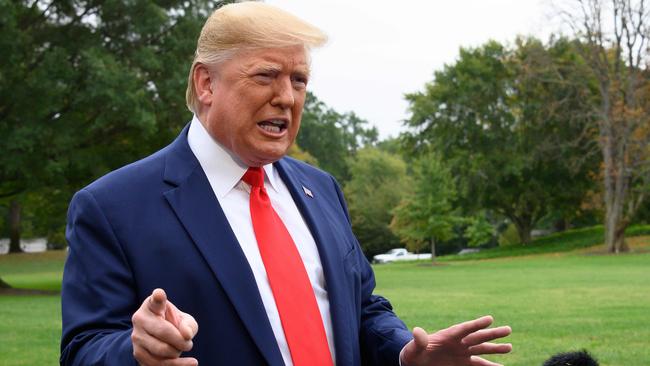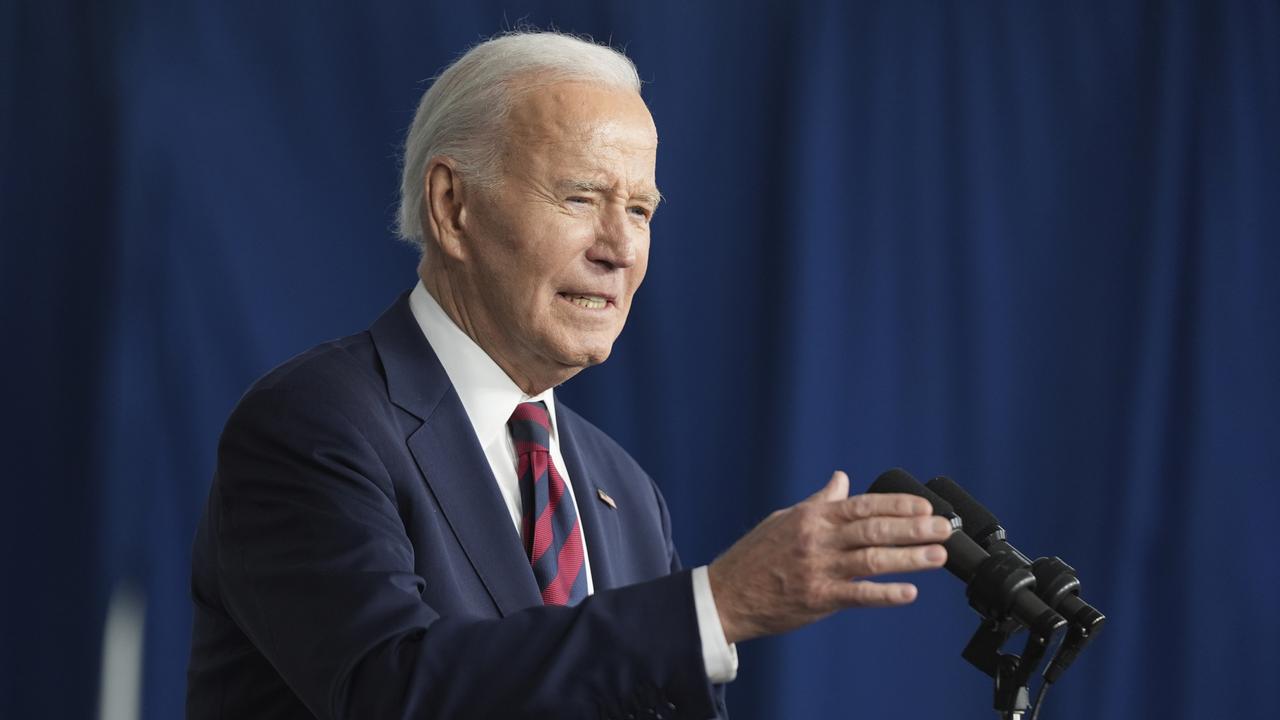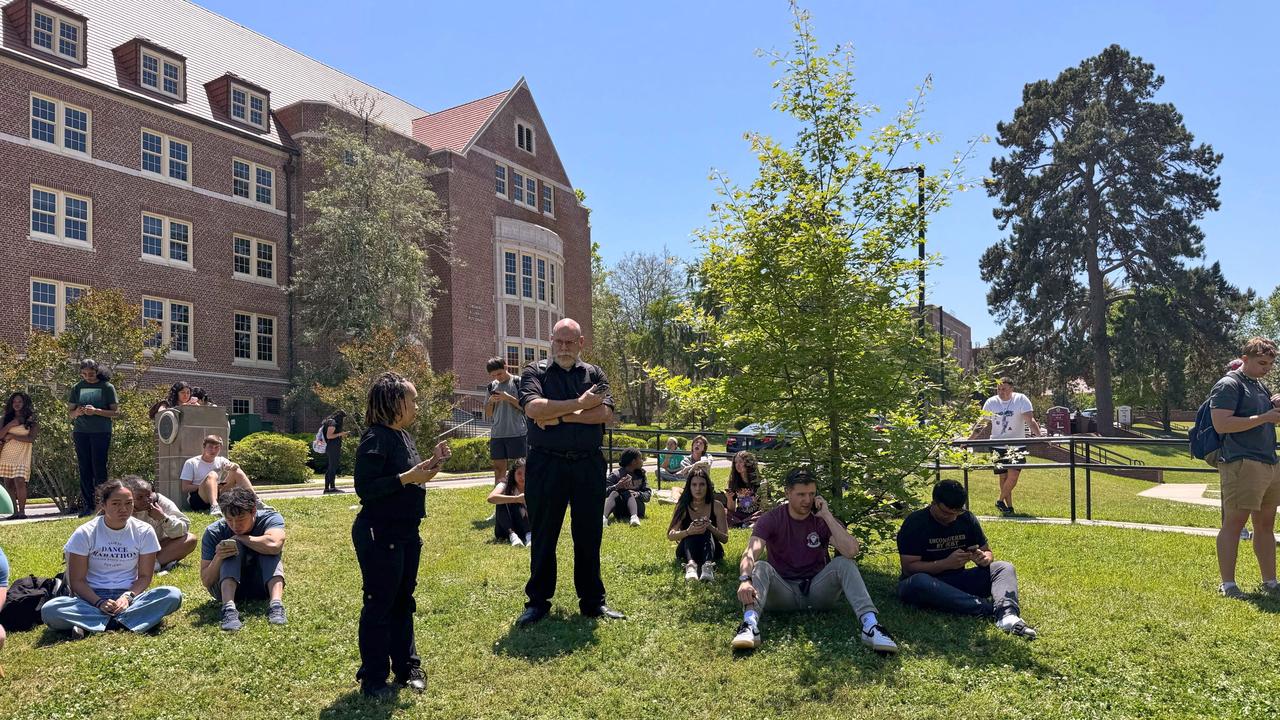‘Multiple whistleblowers’ come forward over Trump complaint
Legal team for the agent behind the Ukraine call complaint is advising ‘multiple whistleblowers.’

The legal team representing the Central Intelligence Agency officer behind the complaint that helped spark an impeachment inquiry into President Trump is now advising “multiple whistleblowers,” the attorneys said Sunday.
The existence of at least one additional whistleblower could complicate President Trump’s efforts to counter the impeachment proceedings building against him in Congress. Mr Trump repeatedly has sought to attack the credibility and motive of the first individual who filed a formal whistleblower complaint in August.
“I can confirm that my firm and my team represent multiple whistleblowers,” Andrew Bakaj, the lead lawyer for the first whistleblower, said in a tweet. “No further comment at this time.”
Mark Zaid, another lawyer representing the initial whistleblower, said that a second whistleblower, also an intelligence official, has come forward with first-hand knowledge of some of the allegations described in the initial complaint, which describe efforts by Mr Trump to press his Ukrainian counterpart to investigate a political rival just as aid to the country was being held up.
Mr Zaid said on Twitter that the second whistleblower “made a protected disclosure under the law and cannot be retaliated against.”
Asked to clarify if his team had been approached by only one additional potential whistleblower or others as well, Mr Zaid replied: “There are definitely multiple whistleblowers.” He offered no further comment.
The whistleblower complaint, released late last month after the Trump administration sought to block its transmission to Congress, alleges that Mr Trump sought to use the powers of his office to push Ukraine to investigate Democratic rival Joe Biden, and that White House officials acted to conceal evidence of the president’s actions.
It said it drew from testimonials of several unidentified US officials who expressed concern about Mr Trump’s conduct to the whistleblower.
During his phone conversation with Ukrainian President Volodymyr Zelensky on July 25, Mr Trump pressed Mr Zelensky to investigate Joe Biden and his son, Hunter, according to a reconstructed transcript released by the White House.
During the call, Mr Trump mentioned the aid that the US provides Ukraine, but he didn’t present it as an explicit quid pro quo for a probe of the Bidens. Text messages among State Department officials released last week show some administration officials believed there was a link between the aid holdup and Mr Trump’s interest in Kiev’s launching new probes.
The White House didn’t respond to a request for comment. Mr Trump repeatedly has lashed out at the whistleblower, saying he had the right as president to learn his identity and confront his allegations, and suggested he and anyone who provided information for the complaint were committing treason. The president has also denied any impropriety on the call.
Despite the president’s attacks, a White House official said last week that the White House hadn’t actively sought to learn the whistleblower’s identity and hadn’t contacted the intelligence community’s inspector general to ask for that information.
Democrats and some Republicans have defended the whistleblower and pointed out that he is entitled to protection, including anonymity, provided under federal whistleblowing laws. But the president’s close allies continued to defend his conduct on Sunday while seeking to discredit the appearance of additional whistleblowers.
“When it comes to ‘more whistleblowers coming forward’ … I’ve seen this movie before — with Brett #Kavanaugh,” Sen. Lindsey Graham tweeted, referring to multiple women who came forward last year with allegations of sexual misconduct against Supreme Court Justice Brett Kavanaugh during his Senate confirmation. “More and more doesn’t mean better or reliable.”
Mr Trump and his allies also have attempted to portray the whistleblower complaint, which was based on information from more than a half-dozen US officials, as a partisan plot by Democrats in Congress, federal officials and the whistleblower’s lawyers.
Mr Bakaj, the whistleblower’s lead lawyer and a former intelligence and Pentagon official, donated $100 in April — before the events alleged in the complaint took place—to a Democratic technology non-profit, earmarking it for Mr Biden’s campaign. He declined to comment about the donation.
Mr Atkinson, the Trump-appointed intelligence community inspector general, said in his review of the complaint that he found some indications of possible political bias on the part of the first whistleblower, but he concluded the complaint was both urgent and credible.
House Intelligence Committee members are still trying to confidentially interview the first whistleblower, whose action set into motion a sequence of events that has rapidly become a political threat to Mr Trump. That interview could happen as soon as this week, although discussions between the lawyers and committee staff are ongoing.
Mr Trump and his allies have said he has a right to ask foreign leaders to investigate corruption and have denied he did anything wrong in his efforts to press the Ukrainian leader. Democrats have cited the allegations as evidence that the president and his administration were willing to use the power of his office to persuade a foreign country to undertake a probe that would be beneficial to his re-election campaign.
Text messages released by House committees last week revealed that administration officials sought to use a White House meeting between Mr Trump and Mr Zelensky as leverage to press the Ukrainian government to pursue an investigation into Mr Biden and other matters.
The messages indicate that US officials co-ordinated with aides to the Ukrainian president and Rudy Giuliani, Mr Trump’s private lawyer, on a draft statement in which Kiev would announce an investigation into Mr Biden and the 2016 US election—at the same time as announcing a visit by the Ukrainian president to the White House.
The emergence of at least one additional whistleblower “demonstrates that there was a view by more than one civil servant that this behaviour by the president was inappropriate, unprofessional and possibly impeachable,” said Bradley Moss, a whistleblower lawyer who is a partner in Mr Zaid’s firm but who isn’t involved in the Ukraine case. “More importantly, this ensures that the ultimate factual record will be more complete and comprehensive.”
Mr Trump over the weekend struck out at his few Republican critics, singling out Sen. Mitt Romney as a “pompous ass” in a Twitter message. Mr Romney last week called Mr Trump’s pressure on Ukraine and his comments inviting China to undertake a probe “wrong and appalling.”
Other Republicans on Sunday largely demurred when asked on news programs about Mr Trump’s conversations with foreign leaders.
“I don’t think he really meant ‘go investigate,’ ” said Rep. Jim Jordan, in an interview on ABC. “Do you think China’s going to go investigate him?”
The White House didn’t respond to a question about whether Mr Trump was serious when he said at the White House last week: “China should start an investigation into the Bidens.”
Republicans also played down the seriousness of Mr Trump’s conversations with Mr Zelensky.
“I do think it’s not unusual for foreign leaders when they talk to each other to say, ‘Here’s something I’d like you do for me,’ whether it’s a trade agreement or some other agreement,” Sen. Roy Blunt said on CBS.
Democrats said that Mr Trump’s requests have focused mainly on Mr Biden, a potential 2020 rival. “I’m sure presidents have in the past asked other leaders for favours,” Rep. Jim Himes told CBS. “Traditionally those favours have not been: ‘research my political opponent.’ ”
Sen. Ron Johnson, asked about his comment in a Wall Street Journal article that he “winced” upon learning in August that military aid to Ukraine had been held up amid White House requests for a Ukrainian investigation, said on NBC: “I didn’t want those connected, and I supported the aid.”
Mr Johnson in a combative interview also said Mr Trump is entitled to an accounting of 2016 election interference, which led to investigations by US intelligence and law enforcement that concluded that Russia interfered to help Mr Trump win.
The Wall St Journal



To join the conversation, please log in. Don't have an account? Register
Join the conversation, you are commenting as Logout